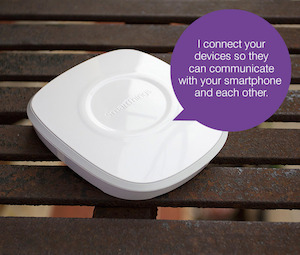
Another thing for the Internet of things.
Samsung has decided to take a different home automation route than Apple or Google. The announcement this week that it is acquiring SmartThings gives a hint that the Korean consumer electronic giant is looking, first and foremost, at creating an automation platform for its own vast array of products, rather than a web service business built around its smart phones. It might eventually do that too, but the decision to go with SmartThings, which relies on an in-home hub, shows a definite hardware-centric attitude.
That’s not to say Samsung isn’t interested in connecting products made by its competitors. According to a blog post by SmartThings CEO Alex Hawkinson…
While we will remain operationally independent, joining forces with Samsung will enable us to support all of the leading smartphone vendors, devices, and applications; expand our base of developers and enhance the tools and programs that they rely on; and help many more people around the world easily control and monitor their homes using SmartThings.
But the top priority is no doubt leveraging Samsung’s appliance and consumer electronics strength to create a unified and seamless home automation experience with its own products. It fits: Samsung is a hardware manufacturer and not a web services company. So it’s substituting a gadget for the powerful online platforms that Apple and, particularly, Google boast. Instead of having to provision a web service that supports a bazillion different products, Samsung only has to, at most, maintain a single point of contact per home.
Another advantage of a dedicated hub is that the products themselves don’t need extensive, and relatively expensive, networking or processing capability, rather just enough connectivity to get to the hub and respond to its commands. It makes it cheaper for consumers that own a lot of networkable Samsung products, and easier for Samsung engineers to build that capability into different devices quickly.
